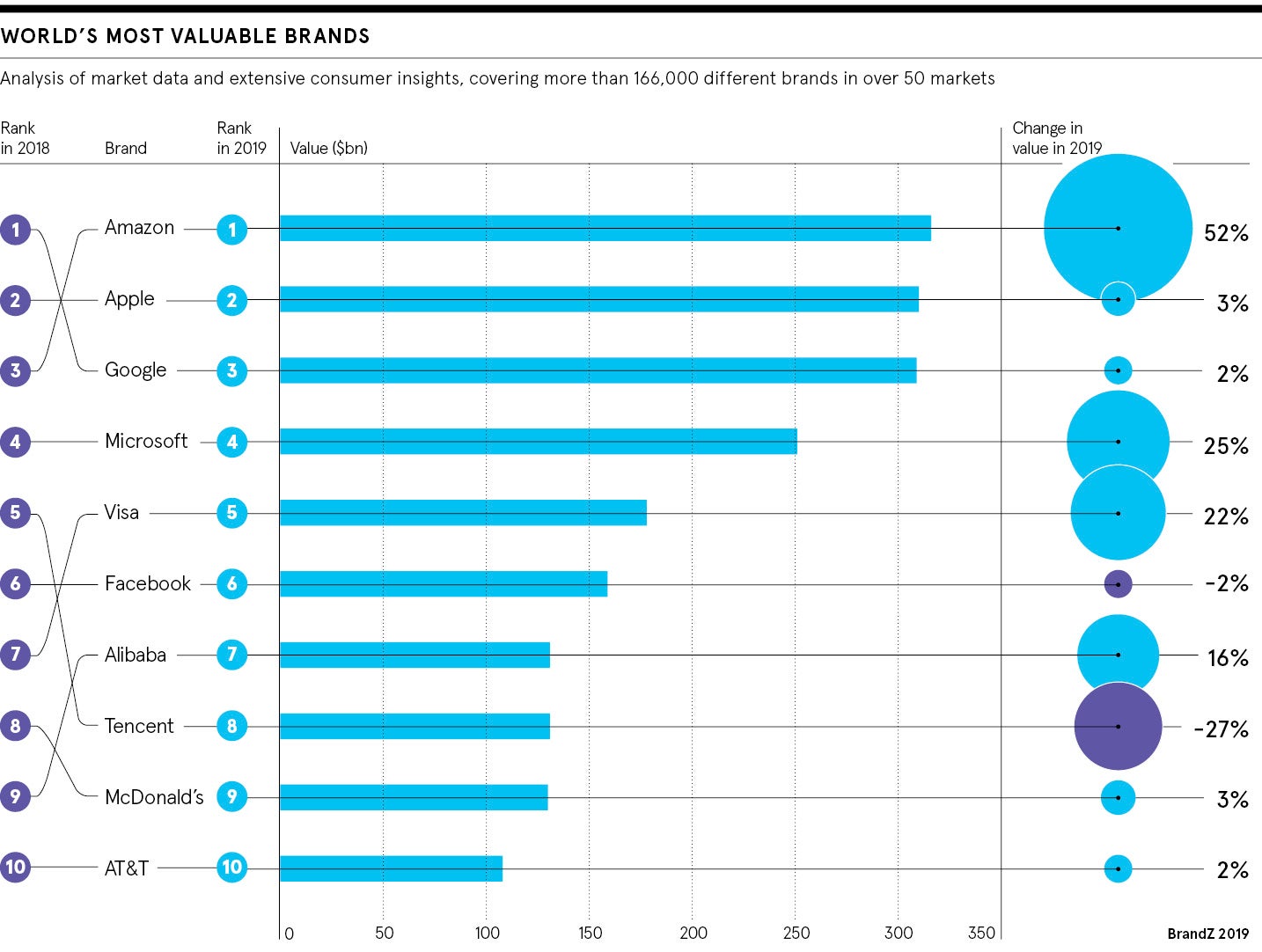Jeff Bezos was driving from New York to Seattle when he started sketching out a business plan. In 1993, the internet was growing rapidly, but hadn’t yet been used for commercial purposes. The would-be entrepreneur spotted an opportunity: selling books was a shoe-in for the world wide web. Not long after, he quit his job at a hedge fund and dedicated his career to Amazon.
The company went public in May 1997 with a market value of some $438 million. These days that figure is close to $880 billion, making it one of the world’s largest public corporations. But its brand value is almost impossible to quantify and brand integrity is even harder to measure. Amazon is regularly cited as one of the world’s most valuable companies, but arguably this is in the gift of the consumer.
It’s a problem that many companies are grappling with. Intangible assets are the dominant driver of long-term value creation in an interconnected, often service-based, world and yet the path to true brand integrity is anything but straightforward, particularly against a backdrop of political polarisation and the primacy of social media.
“It’s difficult to assess a brand’s true value because it’s utterly subjective,” says Louise Nicolson, author of The Entrepreneurial Myth, which examines ways in which entrepreneurialism is being misrepresented to the detriment of businesses’ potential.
How spending habits shape brand value
She explains that what adds complexity is companies have limited control over their true brand value, because they only have a certain degree of influence over public perception. “Brand value might be born in the boardroom, but it matures in the market and is ultimately determined by the heads, hearts and spending habits of consumers,” says Ms Nicolson.
Brand integrity is about being true to your brand positioning
A 2019 report by global public relations and marketing consultancy Edelman shows that consumers are more discerning than any generation before them when it comes to brands and how they choose to spend their money. An eight-country survey for the report showed the vast majority of consumers, regardless of age, income and gender, agree that their ability to trust a brand is central to any buying decision.
Some 81 per cent said they would only consider purchasing a particular product from a brand if they were able to trust it to “do what is right” and 53 per cent agreed every brand has a responsibility to get involved in at least one social issue that does not directly impact its business.
Brand integrity crucial for savvy shoppers
Ms Nicolson says this creates a unique challenge for businesses as they must strike a balance between taking a stand, but always remaining authentic. “The key to success here is knowing your customer really, really well,” she says.
Members of the public are simply too savvy for companies to try and enhance their brands by taking a stand on an issue that is totally unrelated to the business. “That will only backfire,” warns Ms Nicolson.

Angus McLean, digital director at media and marketing consultancy Ebiquity, agrees. “Without a doubt these are challenging times for brands, as the political and media landscape polarises to the left and right in tandem with consumers,” he says.
“The big question is whether brands should align with one side or the other in their positioning, or remain impartial and rely on their existing brand equity and credentials to appeal to their customers.
“Brand integrity is not, in my opinion, about being a ‘good’ corporate citizen, but rather it is about being true to your brand positioning.”
Why brands must do their bit to save the world
As corporations wake up to the fact that trust is crucial to ensuring brand integrity, industry standards and benchmarks, designed to create accountability, are rapidly gaining in popularity, the hope being that companies doing “good” will also do well financially.
In 2018, the Consumer Goods Forum, which represents about 400 retailers and manufacturers in 70 countries, created a benchmark to support the development of more socially and environmentally responsible supply chains.
Some of the world’s biggest brands, including KitKat-maker Nestlé and global retailer Walmart, have backed this initiative to improve global supply chains and ensure goods and services are provided in a humane and sustainable way. Dozens of companies have committed to no-deforestation pledges and to cut carbon emissions.
Multinational consumer goods giant Unilever, which makes products including Dove, Comfort and Sure, earlier this year pledged to halve the amount of plastic it uses every year, from approximately 700,000 tonnes currently. Often making such a commitment won’t necessarily enhance a brand’s perceived integrity, but not making it carries a substantial risk of damaging it.
Over the past five years, Unilever’s share price has appreciated by almost 70 per cent, solidly outperforming the mere 9 per cent gain in the broader FTSE 100 Index of which it is a constituent, and although a host of macroeconomic and other factors are likely to have helped fuel the rise in stock price, brand integrity has arguably played a role.
In fact, Vicky Bullen, chief executive of brand and design agency Coley Porter Bell, which is part of Ogilvy, highlights Unilever as an example of a company that has “exceptional brand integrity”.
Ms Bullen concludes: “Unilever believes business growth should not be at the expense of people or the planet. And its strong governance systems ensure its brands live this.”
How spending habits shape brand value
Brand integrity crucial for savvy shoppers




